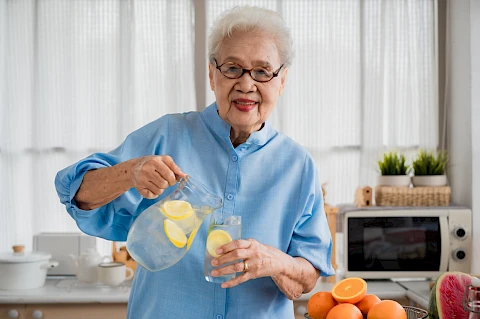
Dehydration is a serious health risk for seniors. The body's ability to retain water declines with time, making hydration a steady part of maintaining daily health. Our goal today is to educate caregivers on the risks and signs of dehydration while sharing effective strategies to encourage and monitor fluid intake.
Dehydration in Seniors: An Overview
Seniors are more susceptible to dehydration for several reasons. The sense of thirst may weaken, meaning they may not feel thirsty even when they need fluids. Certain medications, kidney changes, and chronic illnesses can contribute to fluid loss or reduced fluid intake. Common causes of dehydration in the elderly include excessive heat, limited mobility, and cognitive impairment.
Dehydration can lead to health complications such as urinary tract infections, kidney stones, confusion, fainting, or even hospitalization. Understanding these risks is the first step to taking preventive measures.
Recognizing the Signs of Dehydration
Know how to detect dehydration early. Caregivers should be aware of both physical and behavioral signs, including:
- Dark urine
- Unusually frequent urination
- Dry mouth or skin
- Fatigue or dizziness
- Confusion or irritability
If you notice these signs, take action right away.
Strategies to Encourage Fluid Intake
Encouraging regular fluid intake can prevent dehydration. Developing a routine makes staying hydrated a habit. Offering small amounts of fluid frequently throughout the day can be more effective than offering large quantities at once.
Get creative in increasing fluid consumption! Infuse water with fruits or mint for extra flavor, or introduce enticing options like herbal teas and broth-based soups. As a caregiver, your persistent encouragement can make a difference, reminding seniors to drink regularly even if they're not thirsty.
Monitoring Hydration Status
Keeping track of a senior's fluid intake helps identify when adjustments are needed. Use tools such as hydration apps or "smart" water bottles to monitor daily consumption. Regular assessments help caregivers tailor hydration strategies to the individual's needs, accounting for factors such as medication changes or seasonal temperature shifts.
Caregivers should adjust fluid goals based on activity levels or their healthcare provider's medical advice. Regular monitoring helps prevent problems before they escalate.
Hydrating Foods for Seniors
Incorporating hydrating foods into seniors' diets can significantly boost their fluid intake. Some great water-rich foods include cucumbers, which contain about 96% water; oranges and watermelon, each containing about 88-92% water; and yogurt, a hydrating and nutritious option. Including these foods in meals or snacks adds variety and appeal. Simple recipes like a cucumber salad or a citrus fruit bowl can make meal times enjoyable while contributing to better hydration.
Helping Loved Ones Stay Safely Hydrated
Seniors need to stay hydrated to maintain their health and independence. Caregivers can support this by watching for early signs of dehydration and creating simple, enjoyable routines around fluid intake.
If you're caring for a senior loved one and need support, contact us at Senior Helpers Southeastern Indiana. We're here to provide professional senior care in the North Vernon, Jeffersonville, Clarksville, Corydon, and Charlestown areas. Together, we can ensure our seniors stay healthy and hydrated.